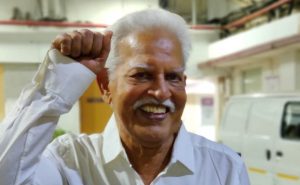
India figures on list of top 10 ten countries that jail writers, academics & intellectuals

India has the dubious distinction of figuring among the top ten list of countries that jail writers, academics and intellectual for their writings, works and advocacy. A growing intolerant climate fostered by the BJP-led government, which is coming down heavily on its citizen’s right to freely express themselves has led to this situation.
The 2021 Freedom to Write report published on Wednesday (April 13) by non-governmental organisation Pen America, which works to protect freedom of expression across the world, said eight out of the 237 writers and academics detained or in prison in 36 countries last year, are from India.
The eight are comedian Munawar Faruqui and the Bhima Koregaon accused persons, Varavara Rao, Sudha Bharadwaj, Vernon Gonsalves, Hany Babu, Gautam Navlakha, Arun Ferreira and Anand Teltumbde.
Pen America quoted from a US government-funded non-governmental organisation, Freedom House report, which said the environment for free expression in India had come down in 2021. Pertinently, India’s status on political rights and civil liberties had dropped to “partly free” in annual rankings from a “free” India in 2020.
The Pen report warned that India remains the only relatively free and democratic country in their Index’s top ten. But jailing of writers and broader curbs on free expression represent but one element of the ruling party’s attempts to quash dissent and entrench political control.
Also read: Varavara Rao’s plea for permanent medical bail rejected, temporary bail extended by 3 months
The ‘Infamous’ Eight
The report also details Faruqui’s arrest in January last year in Indore. He was hauled off to jail based on a complaint that he was allegedly going to make objectionable statements about Hindu deities at his show. The Indore Police also had no visual evidence to prove that Faruqui had indeed insulted Hindu deities and he was granted bail after a month.
The report also talks about the others, who were arrested in the Bhima Koregaon case. This case involved caste violence that broke out in a village near Pune in 2018, for which 16 people were arrested for allegedly plotting the violence.

While Sudha Bharadwaj is out on bail, an ailing 82-year-old activist-poet Varavara Rao got medical bail, which has been extended several times by the Bombay High Court since September. However, the rest are still languishing in jail. The report also highlights that the detainees in the Bhima Koregoan case are suffering from various health issues and how tribal rights activist Stan Swamy had died at a Mumbai hospital, while in police custody on July 5. His death came nine months after was he was arrested under the Unlawful Activities (Prevention) Act.
The injustices faced by these activists in jail are detailed in the report. For example, in Gautam Navlakha’s case, his spectacles had been stolen in jail. But the jail authorities refused to accept the one sent by his family. The courts have also constantly rejected the bail requests of Gonsalves and Teltumbde. They are not allowed to write to their lawyers, and Anand Teltumbde was not given bail even after his brother’s death in November 2021.
Also read: 4,690 UAPA arrests between 2018-21; only 3.1% convictions
Virulent brand of Hindu nationalism poses a threat
The PEN report emphasised that those who champion the marginalised and minority groups and criticised Prime Minister Narendra Modi’s “increasingly virulent brand of Hindu nationalism” were at “risk” in India.
They gave the example of journalist Rana Ayyub, who has been “slapped with spurious charges of money laundering.” Though she has not been detained, according to the report, Ayyub’s case is indicative of how in the recent years, “dozens of Indian writers and public intellectuals have faced spurious legal charges, other punitive administrative actions, and threats both on and offline in response to their expression of dissenting viewpoints.”
The Pen report also spoke out against the Internet shutdown for 1,157 hours or 48 days last year, including in Jammu and Kashmir and in the capital New Delhi during the farmers’ protest.


